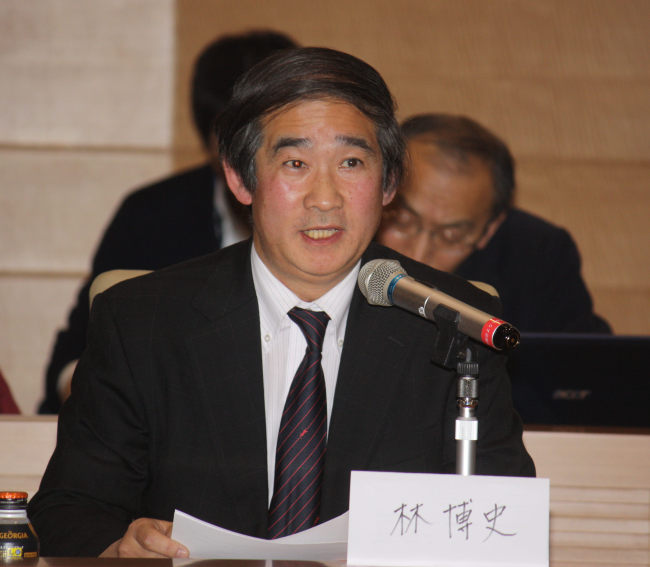Over 1,300 Japanese scholars protest review of 1993 apology
By Shin Hyon-heePublished : March 13, 2014 - 20:59

More than 1,300 Japanese academics have joined a protest against Tokyo’s move to review and alter its 1993 apology for its military’s wartime mobilization of sex slaves, a news report said Thursday.
Hirofumi Hayashi, a politics professor at Kanto Gakuin University, and 14 other scholars have launched a signature-collecting drive against retaining and developing the statement by then-Chief Cabinet Secretary Yohei Kono, the Tokyo Shimbun reported.
The apology, along with a 1995 statement by former Japanese Prime Minister Tomiichi Murayama, had set the stage for a thaw in relations between Seoul and Tokyo.
They called on the Japanese government to heed the spirit of the Kono statement to help “recover the honor and dignity of the women victims” and maintain positive relations with other countries.
“Though there may be differences in views over the content, (the Kono statement) has been consistently playing an active role as the Japanese government’s acknowledgement of the facts and expression of self-reflection,” the academics were quoted as saying.
“Any reassessment, which virtually represents a denial, will cause serious tension with the international community.”
The campaign came as the Shinzo Abe administration is spurring moves to “reevaluate” the Kono statement.
Japan’s Chief Cabinet Secretary Yoshihide Suga has unveiled plans to set up a team for the cause early this month. His deputy Hiroshige Seko also said that after a review, Tokyo will explain the results to the international community.
But calls have been growing in and out of Japan against a series of revisionist moves by the nationalist premier.
At the U.N. Human Rights Council in Geneva last week, Seoul’s Foreign Minister Yun Byung-se said the issue of the so-called comfort women concerns “universal human rights,” urging Tokyo’s political leaders to admit to its past wrongdoings and take steps to ease the pain of the aging victims. He also warned that the country will otherwise face “further isolation” from the international community.
China and North Korea have also denounced a recent string of moves and remarks by Japanese officials and politicians whitewashing the country’s imperial past, while the U.S. expressed related concerns to its top regional ally.
Up to 200,000 women, mostly Koreans, are believed to have been forced to work in brothels for Japanese troops during World War II. Of the 237 Korean women who came forward as former sex slaves, 55 are still alive.
By Shin Hyon-hee (heeshin@heraldcorp.com)
Hirofumi Hayashi, a politics professor at Kanto Gakuin University, and 14 other scholars have launched a signature-collecting drive against retaining and developing the statement by then-Chief Cabinet Secretary Yohei Kono, the Tokyo Shimbun reported.
The apology, along with a 1995 statement by former Japanese Prime Minister Tomiichi Murayama, had set the stage for a thaw in relations between Seoul and Tokyo.
They called on the Japanese government to heed the spirit of the Kono statement to help “recover the honor and dignity of the women victims” and maintain positive relations with other countries.
“Though there may be differences in views over the content, (the Kono statement) has been consistently playing an active role as the Japanese government’s acknowledgement of the facts and expression of self-reflection,” the academics were quoted as saying.
“Any reassessment, which virtually represents a denial, will cause serious tension with the international community.”
The campaign came as the Shinzo Abe administration is spurring moves to “reevaluate” the Kono statement.
Japan’s Chief Cabinet Secretary Yoshihide Suga has unveiled plans to set up a team for the cause early this month. His deputy Hiroshige Seko also said that after a review, Tokyo will explain the results to the international community.
But calls have been growing in and out of Japan against a series of revisionist moves by the nationalist premier.
At the U.N. Human Rights Council in Geneva last week, Seoul’s Foreign Minister Yun Byung-se said the issue of the so-called comfort women concerns “universal human rights,” urging Tokyo’s political leaders to admit to its past wrongdoings and take steps to ease the pain of the aging victims. He also warned that the country will otherwise face “further isolation” from the international community.
China and North Korea have also denounced a recent string of moves and remarks by Japanese officials and politicians whitewashing the country’s imperial past, while the U.S. expressed related concerns to its top regional ally.
Up to 200,000 women, mostly Koreans, are believed to have been forced to work in brothels for Japanese troops during World War II. Of the 237 Korean women who came forward as former sex slaves, 55 are still alive.
By Shin Hyon-hee (heeshin@heraldcorp.com)







![[Graphic News] More Koreans say they plan long-distance trips this year](http://res.heraldm.com/phpwas/restmb_idxmake.php?idx=644&simg=/content/image/2024/04/17/20240417050828_0.gif&u=)
![[KH Explains] Hyundai's full hybrid edge to pay off amid slow transition to pure EVs](http://res.heraldm.com/phpwas/restmb_idxmake.php?idx=644&simg=/content/image/2024/04/18/20240418050645_0.jpg&u=20240419100350)





![[From the Scene] Monks, Buddhists hail return of remains of Buddhas](http://res.heraldm.com/phpwas/restmb_idxmake.php?idx=652&simg=/content/image/2024/04/19/20240419050617_0.jpg&u=20240419175937)

![[KH Explains] Hyundai's full hybrid edge to pay off amid slow transition to pure EVs](http://res.heraldm.com/phpwas/restmb_idxmake.php?idx=652&simg=/content/image/2024/04/18/20240418050645_0.jpg&u=20240419100350)

![[Today’s K-pop] Illit drops debut single remix](http://res.heraldm.com/phpwas/restmb_idxmake.php?idx=642&simg=/content/image/2024/04/19/20240419050612_0.jpg&u=)